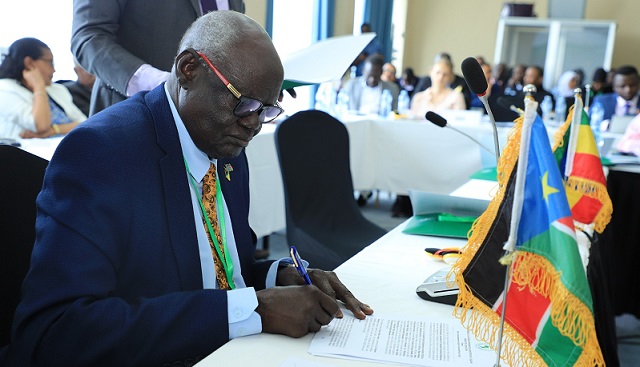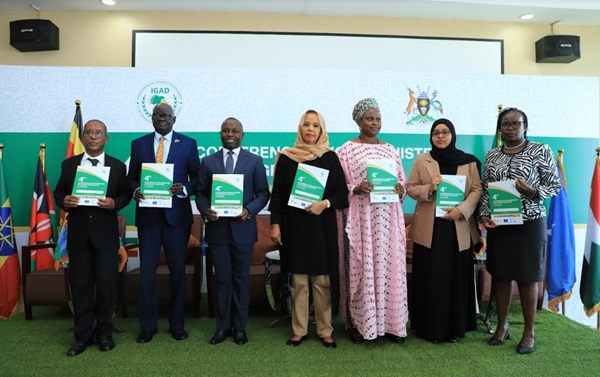
They need quality, opportunities, says IGAD Executive Secretary
Kampala, Uganda | RONALD MUSOKE | Education ministers in the Intergovernmental Authority on Development (IGAD) bloc want member states to prioritise high quality education for disaster affected populations, 60% of whom are said to be of school-going age.
At a recent meeting in Entebbe, Uganda, they adopted several recommendations of the high-level technical expert session of the 4th conference of IGAD ministers in charge of education. The recommendations are supposed to implement the Djibouti Declaration on Education for refugees, returnees, IDPs and host communities.
It is a major undertaking as over 15 million people are currently displaced in the IGAD bloc due to emergencies triggered by war and natural calamities such as the climate change crisis.
The Entebbe conference was held on May 27-30 under the theme, ‘Towards Quality and Inclusive Education for All.’ It committed to provide educational opportunities for students in emergency contexts in the IGAD member states, promote intra-regional mobility of experts in the IGAD region, with particular emphasis on those experiencing forced displacement.
The ministers also urged institutions of higher learning in the IGAD region, with the support of regional and international partners, to provide scholarship opportunities to learners in emergencies.
“We commit to promote student enrolment, retention and completion rates, including through free basic education programmes,” the ministers noted in a joint statement issued on May 30.
On the regional response to climate change and education, the ministers requested the IGAD Secretariat, partners and member states to undertake comprehensive studies to generate evidence on climate change, education and development nexus.
“We urge IGAD member states to rethink the education curriculum in the context of climate change and indigenous knowledge and adaptation as well as promote the use of alternative energy in school and education establishments as a response to the impact of climate change.”
The IGAD bloc comprises countries in the East and Horn of Africa region including; Djibouti, Eritrea, Ethiopia, Kenya, Somalia, South Sudan, Sudan and Uganda. This bloc which is 5.2 million sq km in size has perennially grappled with a refugee and internally displaced persons crisis.
Recent estimates show that this region hosts more than 15 million displaced people including 5.2 million refugees and 9.6 million IDPs. Their education has been disrupted and their hopes and aspirations destroyed.
Mira Musa Nimir, a refugee representative from Sudan told the Entebbe Conference that most of the time when school-going people flee their home countries, they grapple with the challenge of how to join the education system in the host country.
She said they often lack “quality documents” required in order to be assisted to continue with their studies. She said refugees also lack qualified teachers in the camps. Nimir told the conference that quality education is important because it helps refugee learners to face the world when they return to their home countries.
IGAD’s school drop-out crisis
An IGAD brief has revealed that dropping out of the school system is a major accumulated problem in the region, especially for girls. It attributed the problem to economic, social, cultural, and religious reasons and urged member state to look for durable solution for refugee, returnee, and other forcibly displaced populations (IDPs).
“Our citizens demand access to quality, affordable, equitable, and relevant education and skills development opportunities,” said Dr. Workneh Gebeyehu (PhD), the Executive Secretary of IGAD , adding that the IGAD region, just like the bigger continent, is youthful, a reality which is presenting both opportunities and challenges.
He said education is a fundamental human right and a cornerstone for sustainable development and peace and stability are essential for displaced persons to realise their dreams and aspirations.
“Young people are dynamic, creative, receptive, and innovative,” he said, “They need enabling policies, strategies, and investment opportunities to educate and skill themselves.”
Gabriel Changson Chang, the Minister of High Education of South Sudan thanked the country’s neighbours for hosting very large numbers of South Sudanese refugees who are also advancing their education in the host countries.
However, he quickly noted that South Sudan is also a refugee hosting country, particularly from Sudan and DR Congo and as such, it is equally committed to the Djibouti Declaration of supporting these refugees.
Still, Chang called upon its more established neighbours not to tire but to continue supporting the young country develop its education institutions, policies and frameworks. He called upon Uganda, Kenya and other IGAD member countries to provide scholarships to South Sudanese students just like Ethiopia, Sudan and Rwanda do.
Chang said South Sudan has been finding difficulty with its immediate neighbours because of education certification issues. However, he said he is optimistic that the IGAD qualification framework will help South Sudan streamline its quality assurance standards.
“We are just developing a national quality framework for the country. This framework will see South Sudanese educational qualifications right from primary school level to university aligned with the East African education certification so that the movement of our students is secured,” he said.
IGAD Qualifications Framework
The IGAD bloc has been working with member states and several partners, including the UNHCR, UNESCO, UNICEF, Education Cannot Wait, the European Union, and the German International Cooperation Agency (GIZ) to address the challenges in education both for the cross-border mobile population, refugees, returnees and other displaced people in the region. This is usually in consultation and advice from member states.
In December 2017, IGAD organised the first high-level regional conference of ministers in charge of education in Djibouti. That conference adopted the Djibouti Declaration and Plan of Action on education for refugees, returnees and host communities.
The Djibouti Declaration emphasised five key strategic interventions; inclusion of refugees and returnees into national education systems with a multi-year costed plan of action; higher education and TVET/ post-secondary skills and competencies; regional qualifications Framework, accreditation and certification of education, as well as resource mobilization and partnership.
The declaration was followed by a series of awareness creation platforms, consultative meetings with partners; and bi-annual meetings of IGAD experts and two annual meetings of IGAD ministers in charge of education.
IGAD also organized a meeting of experts in charge of education and partners in December 2021 which came up with strong recommendations that were reviewed and endorsed by the IGAD Ministers in charge of education in March, 2022 during a conference held in the Ethiopian capital, Addis Ababa.
The Addis Ababa Call for Action stressed the need for developing a costed national education response plan. It’s upon this background upon which the Entebbe conference met to among other things review the implementation status of those recommendations, including the elaboration of the IGAD Regional Qualifications Framework (IGADQF).

Prof Umar Kakumba, the Deputy Vice Chancellor (Academic Affairs) at Makerere University who represented the IGAD Universities Forum at the Entebbe conference commended the effort that IGAD is making towards education in general and higher education in particular but also enabling the opportunity for the mobility of human capital development across the IGAD region.
He said Makerere University has already made considerable effort in implementing this framework even before the IGAD qualification framework is ratified by the member states.
Prof. Kakumba said Makerere University has been a pioneer within the region to reduce on its entry requirements by creating a 5% quota for refugees to access high education. “Makerere being a premier university in East and central Africa; that is a great opportunity to open its doors to refugee students,” he said.
Makerere University has partnered with the Mastercard Foundation for the next 10 years to create scholarships that are targeting refugees, IDPs, returnees, and host communities. For the next 10 years, US$45 million have been entrusted with Makerere University.
The university has created a special desk to enable interaction with the Uganda National Examinations Board (UNEB) and the International Council for Higher Education to help prospective refugee learners get documents equated to the Ugandan standards.
Makerere University has also established a centre for languages with particular emphasis on French and English to help improve proficiency because the language of instruction in high education in Uganda is English. It offers proficiency tests as they register and enroll on the degree or diploma programmes.
Uganda’s leading role
Peter Ogwang, the Minister of State for Education and Sports told the conference that since the adoption of the Djibouti Declaration in 2017, Uganda has played a proactive role in implementing the Declaration.
“Uganda takes pride in being the first IGAD member state to develop the multi-year Education Response Plan (ERP) for refugees and the host communities to translate the commitments we made in Djibouti into action.
“We now have the second ERP that is being rolled out to improve access to education for crisis affected learners. Our deliberations over the past four days have underscored the critical role education plays in shaping the future of our nations and the broad IGAD region.”
“The IGAD Regional Qualifications Framework offer important insights relevant to our own National Qualifications Framework. The process of designing the Uganda Qualifications Framework has already started, and we believe we will have it completed as soon as possible.”
Ogwang also told the conference that Uganda is committed to institutionalising the national qualification framework. “As you are aware, Qualifications Frameworks are vital for quality outcomes, regional mobility, comparability and recognition of qualifications as well as access to education, employment opportunities and of course, improved livelihoods.”
“The beneficiaries will not only be refugees and other displacement-affected people but all citizens of member states. Ogwang noted that the qualification frameworks will go a long way in standardizing our education systems in the region.
The Ugandan minister said the process of designing the Uganda qualification framework has already begun and it will be completed “as soon as possible,” noting that Uganda is committed to institutionalizing the National Qualification Framework.
Dr. Gebeyehu, the IGAD Executive Secretary, said the IGAD qualification framework is supposed to complement the IGAD protocol on free movement of persons, as a key enabler for fulfilment of some rights guaranteed under the protocol. “The benefits are not exclusively confined to refugees and displaced persons, but rather for all citizens of the region.”
 The Independent Uganda: You get the Truth we Pay the Price
The Independent Uganda: You get the Truth we Pay the Price



